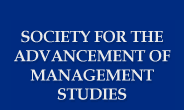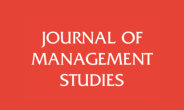Open Special Issue Calls
Interdisciplinarity in Management Research: Premises, Promises, and Pitfalls
– Deadline: 31 March 2025
Innovation for Climate Change Mitigation and Adaptation
– Deadline: 31 May 2025
What do Social and Environmental Responsibilities Mean in the ‘Global South’? Towards Pluriversal Perspectives in Management Studies
– Deadline: 31 August 2025
Social Movements and Organizing towards (Un)Desirable Futures
– Deadline: 30 September 2025
Toward Society-Centred Responsible Leadership: Perspectives on Theory, Practices, and Challenges
– Deadline: 31 October 2025
Lifestyle Entrepreneurship: Turning what you Love into a Business
– Deadline: 15 January 2026
General Guidelines for Special Issue Proposals
A JMS Special Issue is a refereed collection of articles on a predetermined theme within the broader context of management studies. The theme typically focuses on an area of inquiry that has not been sufficiently explored in management literature, and that is sufficiently broad to be of interest to JMS readers. JMS is particularly keen to support Special Issues that address previously neglected themes or develop new or distinctive lines of research.
The team of Guest Editors for a Special Issue will handle all manuscripts from initial submission through the peer review process to the paper’s ultimate decision. All Special Issues will be assigned a dedicated JMS Editor who oversees the Special Issue throughout the process. In line with JMS policy for all papers and in order to ensure consistency in the editorial decision-making process, Guest Editors will consult the JMS Editor as papers progress through the revision process.
Should your proposal be accepted, you will be asked to sign an agreement with JMS regarding the behaviour expected of Guest Editors.
Proposing a Special Issue
JMS considers proposals for Special Issues once a year (closing date: 31 March). The JMS Editors aim to return a decision on your proposal within one month of receipt.
To submit a Special Issue proposal, please email a Word or PDF file to the JMS office (Margaret Turner) at: business.jms@durham.ac.uk, preferably in the weeks ahead of the deadline.
Your proposal should be no more than five pages (excluding points 6 and 7, and references) and contain:
- Executive Summary.
- Justification for why the Special Issue is needed and why it is timely.
- Demonstration of the novelty and originality of the Special Issue vis-a-vis prior Special Issues in JMS and elsewhere.
- Explanation of why the issue is particularly suitable for JMS.
- A proposed timeline and activities related to the Special Issue.
- Backgrounds of the proposed Guest Editors, including visibility on the topic in question, and editorial experience.
- A list of scholars who may be interested in submitting or acting as potential reviewers for your special issue, taking JMS’ global author- and readership in mind.
Further details on points 2-6 are included below.
- Justification for why the Special Issue is needed and why it is timely. We encourage Guest Editors to specify the current state of the phenomenon and/or conversation they seek to address and advance through a Special Issue. This would include explaining the significance of
the topic, associated complications, and why leaving the proposed topic underexplored is problematic from a management studies point of view. Successful Special Issues tend to address a topic that is broad enough to attract a large number of high-quality submissions, evidenced for instance by ongoing tracks at conferences, workshops, etc., yet that is still narrow enough to be clearly focused and warrant special attention.
The proposal should explain how the Special Issue would open-up new and emerging topics or avenues of inquiry, and why this is important in order to advance, challenge or redirect management scholarship on the proposed topic. Further to this, proposals should demonstrate the timeliness of the Special Issue, such that they aim to initiate an important new conversation on the topic or challenge an ongoing conversation which might be at a critical turning point for example. This could be enriched with an illustrative list of potential research questions and ways to address them.
While successful proposals need to be within the aims and scope of JMS to advance management theory, we encourage Guest Editors to illustrate in their proposal how the Special Issue addresses important phenomena and problems that have broader societal and practical relevance and are likely to yield impactful research. More generally, JMS as a journal is agnostic in terms of paradigmatic, theoretical, and methodological choices, and thus accepts proposals from a diverse set of ontological and epistemological positions.
- Demonstration of the novelty and originality of the Special Issue vis-a-vis prior Special Issues in JMS and elsewhere. We expect authors to motivate their Special Issue based on a clear demarcation of the proposed Special Issue compared to prior and currently open Special Issue calls for papers in JMS and related journals. As JMS and many other management journals regularly publish Special Issues on various topics, the novelty and originality of the topic the proposed Special Issue addresses are critical for proposals to be accepted, and so is the encouragement of potentially innovative theoretical and methodological approaches used to understand it.
A list of current JMS Special Issue calls for papers is available here.
- Explanation of why the Special Issue is particularly suitable for JMS. We encourage Guest Editors to explain how the Special Issue: engages in a topic relevant for a management studies audience; how it advances, challenges, or redirects an ongoing conversation taking place in JMS; or how it seeks to introduce a new conversation that is likely to be considered interesting and important by its general management readership. This would include a) specifying whether the proposed Special Issue topic has a history in JMS, or is a topic in which JMS should position itself in order to trigger an important new conversation and b) positioning the Special Issue such that it strikes a balance between having a clear focus on a particular conversation/phenomenon and catering to JMS’ “big tent” ethos where the implications the Special Issue seeks to generate are relevant for a broader management studies audience.
- Proposed timeline and activities related to the Special Issue. We expect Guest Editors to include a snapshot of intended marketing activities for the Special Issue as well as (tentatively) planned pre- and post-submission events (which can be online and offline). Note that the exact timing of a Special Issue will be determined by the JMS office and aligned with other Special Issues running in parallel. Guest Editors should plan for a paper submission deadline roughly 12 months after the submission of this proposal, and no less than 6 months after the publication of the call for papers. Generally, we expect Special Issues to be completed within approximately three years from paper submission deadline to publication.
- Backgrounds of the proposed Guest Editors, including visibility on the topic in question, and editorial experience. We encourage Guest Editors to demonstrate their ability to a) attract high-quality submissions as a result of their exposure in the targeted conversation and their planned outreach activities, and b) handle the Special Issue submissions with a high degree of professionalism that meets the general standards of JMS, including a developmental attitude to authors during the review process.
Guest Editors collectively should comprise a diverse yet experienced team that ideally has some affinity to and experience with JMS, a strong publication track-record, high visibility in the given topic, and prior editorial experience. Given that Special Issues showcase diverse perspectives on a theme, we strongly encourage overall diversity in the Guest Editor team, including but not limited to gender, ethnicity, geography, and/or career stage.
Editing Your Special Issue
If your proposal is approved, you will receive a decision letter providing feedback on your proposal and you will be assigned a JMS Editor. After the approval decision, the JMS Editor will join your editorial team to work with you on your Call for Papers and potentially on your Introductory piece. The JMS Editor will also provide advice on any issues that arise. JMS has a policy of involving a second editor when papers have gone through one or two rounds of revision to ensure consistent quality. The JMS Editor for the Special Issue will act as the second editor for all papers. Before any papers can be formally accepted, they must be signed off by the JMS Editor.
Once the Call has been released and prior to the submission deadline, a meeting will be arranged between the Guest Editors, the assigned JMS Editor, and/or members of the Editorial Office. This is intended to allow the opportunity to discuss any potential ideas related to the Special Issue, answer any queries, and to facilitate future communications between all those working on the Special Issue.
It is important to note that Guest Editors are not permitted to publish papers in the Special Issue apart from the introduction. One paper may be commissioned, but only with the prior agreement of the JMS Editor; anything commissioned without prior discussion and approval from JMS will not be published.
Guest Editors are expected to ensure that the work done on the Special Issue reflects JMS standards. The submission process will be the same as for regular papers via the JMS ScholarOne submission portal. All decision letters must provide high quality feedback, although we recognize that some papers may be so wide of the mark that very little is possible.
It is understood that some papers may require longer to develop than the timing of a Special Issue allows, or that, while showing potential, do not fit within the scope of the Special Issue. Please discuss these cases with your JMS Editor, who may invite the author(s) to submit to JMS directly.
In order to be published, Special Issues should contain no fewer than five papers including the Introduction; Special Issues that do not reach that minimum may become a Themed Section or be incorporated into a regular issue. JMS does not have a maximum number of papers to be included in a Special Issue; the threshold is one of meeting JMS quality standards rather than one of quantity.
Promoting Your Special Issue
JMS will work with Guest Editors to increase the visibility of the Special Issue in the months leading up to the submission deadline and once it has been published.
What JMS will do:
- JMS will circulate your Call for Papers via email, social media, and other relevant networks. It will re-issue the Call at appropriate intervals.
- Once the Special Issue is published, announcements will be made via email, social media and other networks.
What is expected of Guest Editors:
- We expect that Guest Editors will circulate the Call for Papers within their own personal networks, social media groups, and at any relevant conferences or workshops they may attend.
- If it has not already been suggested as part of the proposal, consideration should be given to organizing a conference or workshop either to generate submissions or to aid in the development of submitted papers. A symposium or PDW at a well-known conference may also be considered. A budget is available from JMS for this purpose, on provision of a detailed plan for the use of the funds. If it is being held at a Guest Editor’s institution, it would be expected that the host institution would provide funding/facilities in kind.
- We expect Guest Editors to identify up to 50 scholars for whom the Special Issue will be particularly relevant, who may serve as potential reviewers.

